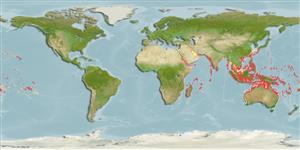Environment: milieu / climate zone / depth range / distribution range
البيئة
بحري مرتبطة بالشعاب; غير مهاجرة; نطاق العمق 0 - 55 m (Ref. 7247). Tropical; 32°N - 36°S, 24°E - 128°W
Indo-Pacific: Red Sea and East Africa to the Line and Pitcairn islands, north to southern Japan, south to Sydney, Australia. Not found in the Hawaiian and Marquesan islands.
الحجم / وزن / العمر
Maturity: Lm ? range ? - ? cm
Max length : 14.0 cm TL ذكر/ مختلط الجنس; (Ref. 89972); أعلا وزن تم نشرة: 45.21 g (Ref. 126022)
الأشواك الظهرية (المجموع) : 12; الأشعة الظهرية الناعمة (المجموع) : 14 - 16; شوكة شرجية: 2; أشعه شرجية لينه: 14 - 15. Juveniles overall black with scale centers bluish; white blotch on forehead and upper sides; all fins black except the transparent pectoral and outer portion of soft dorsal rays. Geographic and behavioral color of adults variable; no spot on forehead; spot on upper sides very reduced; head and fins normally black; scales with black margins. Margins of preorbital, suborbital and preoperculum finely serrated (Ref. 2746). Nuptial fish generally paler color. Body depth 1.4-1.6 in SL (Ref. 90102).
Adults inhabit coral and rocky reefs, juveniles often commensal with large sea anemones, sea urchins, or small coral heads (Ref. 4391, 48636). They occur in small to large aggregations. Stomach contents include algae, copepods, and other planktonic crustaceans (Ref. 7247). Oviparous, distinct pairing during breeding (Ref. 205). Eggs are demersal and adhere to the substrate (Ref. 205). Males guard and aerate the eggs (Ref. 205). Diurnal species (Ref. 54980; 120737). Minimum depth reported taken from Ref. 128797.
Life cycle and mating behavior
النضج | التكاثر | وضع البيض | بيض | الخصوبة | Larvae
Oviparous, distinct pairing during breeding (Ref. 205). Eggs are demersal and adhere to the substrate (Ref. 205). Males guard and aerate the eggs (Ref. 205). Courtship characterized by male 'signal-jumping'. Captive pair reported to spawn thrice monthly with a total of 17 over a 7-month period (Ref. 2856). While protogyny was originally proposed for this species, recent studies confirmed gonochorism in the form of non-functional hermaphroditism (Ref. 103751).
Allen, G.R., 1991. Damselfishes of the world. Mergus Publishers, Melle, Germany. 271 p. (Ref. 7247)
IUCN Red List Status (Ref. 130435: Version 2024-2)
استخدامات بشرية
مصائد: غير مهمة تجارياً; حوض مائي: تجاري
أدوات
تقارير خاصة
Download XML
مصادر علي الأنترنت
Estimates based on models
Preferred temperature (Ref.
123201): 24.6 - 29, mean 28 °C (based on 1240 cells).
Phylogenetic diversity index (Ref.
82804): PD
50 = 0.5005 [Uniqueness, from 0.5 = low to 2.0 = high].
Bayesian length-weight: a=0.03467 (0.02169 - 0.05544), b=2.93 (2.80 - 3.06), in cm total length, based on LWR estimates for this species & (Sub)family-body (Ref.
93245).
مستوى غذائي (Ref.
69278): 3.0 ±0.24 se; based on food items.
المرونه (Ref.
120179): عالي, الحد الزمني الأدني لتضاعف عدد أفراد المجتمع أقل من 15 شهر (Fec=20,000-25,000).
Fishing Vulnerability (Ref.
59153): Low vulnerability (10 of 100).
Nutrients (Ref.
124155): Calcium = 90.3 [45.4, 146.6] mg/100g; Iron = 0.802 [0.476, 1.335] mg/100g; Protein = 18 [17, 19] %; Omega3 = 0.115 [0.067, 0.193] g/100g; Selenium = 27.9 [13.9, 57.3] μg/100g; VitaminA = 123 [33, 443] μg/100g; Zinc = 1.48 [0.97, 2.15] mg/100g (wet weight);
